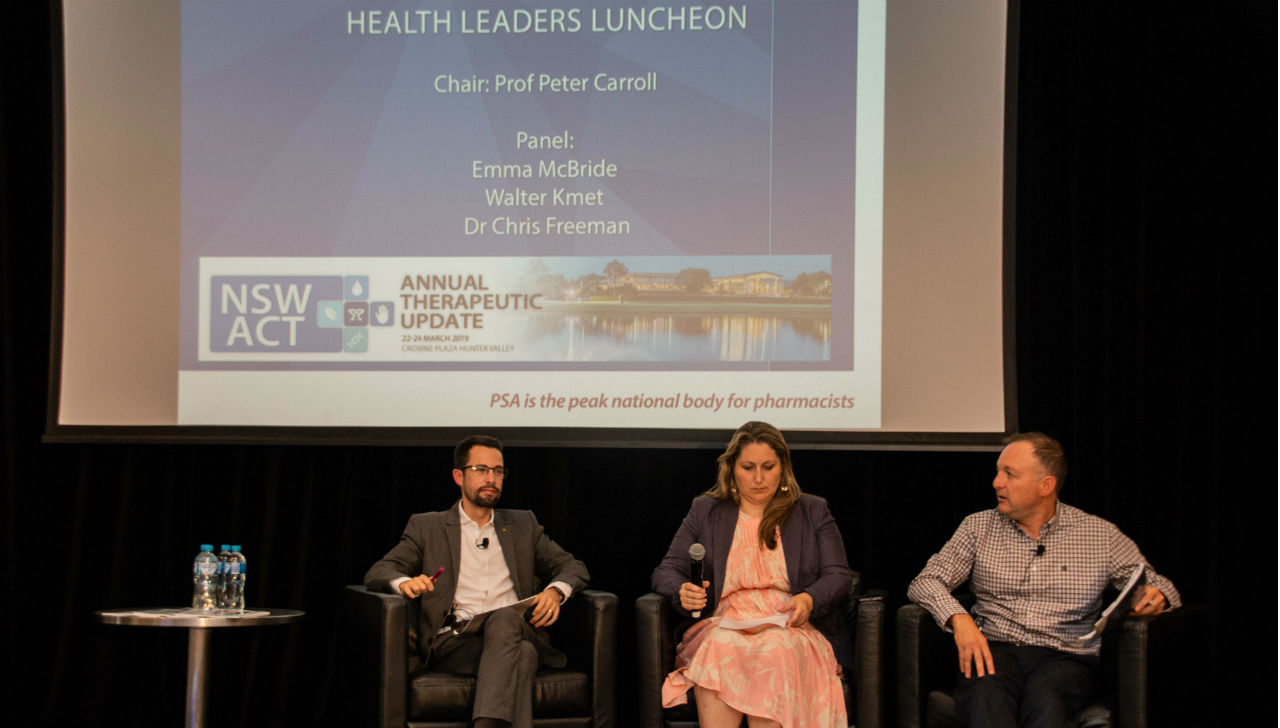Greater funding is needed to unite the pharmacy profession with other healthcare professionals. This was the powerful message that came out of PSA’s NSW/ACT Annual Therapeutic Update (ATU), held on 22-24 March in the Hunter Valley.
The ATU conference drew pharmacists from across the region to learn about the latest advances impacting their pharmacy practice.
In lectures, workshops and discussion groups, pharmacists heard about new medicines, received updates, and learnt how to best manage disease states such as strokes, cardiovascular disease and diabetes.
PSA President Dr Chris Freeman delivered the opening address, highlighting the importance of medicine safety and the outcomes PSA is aiming to achieve through the Pharmacists in 2023 report.
Addressing 2023
Dr Freeman, PSA Interim CEO Dr Shane Jackson, and Vice President of the NSW State Committee and the Chair of the NSW Early Career Pharmacist Working Group (ECPWG) Chelsea Felkai took part in a breakfast panel to present the Pharmacists in 2023 report.
Of the 11 key action items in the report, Dr Freeman said, ‘We didn’t want just another vision document, but some tangible achievable actions over the next five years for the profession to work towards. To move pharmacy and our profession forward.’
Ms Felkai spoke about the importance of the document reflecting the needs of the next generation of pharmacists.‘One of the best things that l think has come out of the Pharmacists in 2023 document is that it has incorporated many of the things we brought up in the ECP submission towards the report. It really focuses on future pharmacists and shows the younger pharmacists a way to move forward.’
In addressing the ‘fragmentation of care’ affecting community pharmacists, Dr Jackson emphasised the necessity for inclusion through funding.
‘Community pharmacy is a vital component in the future of the profession, but it is often seen as separate to the rest of healthcare. What we need to do is make sure that funding mechanisms start to align with the rest of healthcare so we can actually link those services up.
‘We’ve got an opportunity with digital investment, with My Health Record. Community pharmacy will be much better integrated, and be able to communicate with general practice and hospitals, so they will be a much more vital component of the system because they will be linked.’
Health leaders on pharmacy
A Health Leaders Forum, chaired by PSA NSW President Professor Peter Carroll, was led by Emma McBride, Federal Member for Dobell; Walter Kmet, CEO of Macquarie University Hospital and Clinical Services; and Dr Freeman. Delegates questioned the panel about the future of pharmacy, discussing issues such as pharmacist representation, collaborative healthcare teams, aged care and technology implementation.
 PSA President Chris Freeman, Emma McBride and Walter Kmet
PSA President Chris Freeman, Emma McBride and Walter Kmet
Ms McBride emphasised the need for collaboration within the pharmacy profession and speaking with one voice to achieve action.
‘There is such a big role for pharmacists within our healthcare system. There are a number of national health priorities where pharmacists can and should play a more integral role, such as mental health. But there are barriers to pharmacists being front and centre to those discussions,’ Ms McBride said.
‘I think that’s something that each of us as pharmacists can change – speak to your local MP and let them know what pharmacists in your area can do. All of you being here as members of PSA shows that pharmacists can work together. What we need to do as a professional body is work in much closer collaboration to give us a voice at a national level.’
When discussing the opportunities for utilising technologies in Australia to increase the access to health services or medicines, Mr Kmet said the right models of care need to come first.
‘There are a plethora of technologies out there, in terms of medicine management apps. But the issue comes down to applying the technology to a model of care that makes the situation better. Information is everywhere, but what is the model of care around which it should be managed?’ he said.
‘That’s something that team-based care can address – professionals working together in teams so they have the same information and the patient is engaged in that information. That, to me, should be the model of care that technology is applied to – how is a team consistently aware in a way that actually can be assisted through technology, rather than the technology standing alone and potentially creating more complexity.’
Dr Freeman echoed this sentiment when discussing collaborative healthcare teams.
‘Why is there no funding for pharmacists in collaborative teams? Where I get frustrated is when those teams are being put together, pharmacists are forgotten about. We have a large piece of advocacy work to do so that we are seen as central providers of healthcare and not just a nice to have. We need to be there so that teams can provide those health outcomes for patients,’ he said.
Food for thought?
PSA NSW President Professor Peter Carroll also addressed the conference, noting pharmacists’ recent achievements, in particular the expansion of vaccinations. In his opening address, he challenged pharmacists to reconsider their business models, especially around advertising.
‘The promotional brochures that I receive in my letterbox from supermarkets and pharmacies look identical, both offering discount vitamins. I challenged the audience to differentiate between a Coles and pharmacy brochure – and they couldn’t tell the difference,’ he told Australian Pharmacist.
‘With all the professional opportunities that we can provide, why do we promote ourselves as a source of cheap vitamins? It’s not a viable model. I want to see professional flyers inviting me to talk about my medicines, or informing me about what vaccinations I can get.’
Dr Freeman also weighed in on the focus on the push of products over service in his opening address. ‘Why we are facing this is because we get so little of the revenue into the pharmacy environment through the delivery of services so that it’s hard for us to then invest – whether it be in advertising or the rollout of those services – into the community pharmacy sector.’
‘If we are genuine that as a profession we want to move community pharmacy towards a services-based model, then we need a fundamental shift in how we are remunerated so that greater amounts of our revenue is generated through the delivery of those services.’




 Source: Queensland Health Immunisation Program[/caption]
Source: Queensland Health Immunisation Program[/caption]


 Dr Sarah White[/caption]
Dr Sarah White[/caption]






